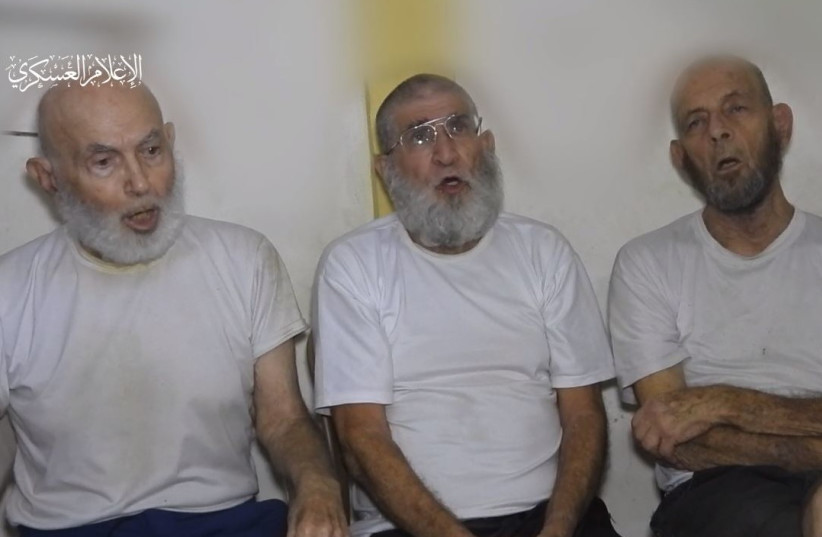A race against time: Critically ill hostages believed to be the next released
As hopes rise for the return of the hostages, discussions focus on the “humanitarian list,” which prioritizes the release of those whose lives are at clear and immediate risk. After nearly 500 days in captivity, experts believe many hostages have been denied proper medical care, causing their health to deteriorate under harsh conditions. Their mental health is also severely impacted, further compromising their ability to survive.
Accounts from recently released hostages paint a grim picture of the physical and mental state of those still in captivity. The last known sign of life from Matan Tsangauker showed him visibly underweight, with injuries to his lips that suggest severe nutritional deficiencies. Alongside Matan, 99 other hostages remain in captivity, many with chronic illnesses requiring daily treatment. Without proper care, they are at immediate risk of death.
Prof. Hagai Levine, head of the health department for the Hostage Families Headquarters, told Maariv: “After 443 days in captivity, every hostage is a humanitarian case at immediate risk of death. The horrific conditions they endure have left them physically and mentally damaged, and we fear for their survival as winter sets in. All the hostages must be brought home in a deal—those who are alive for rehabilitation and those who have perished for a dignified burial.”
These are the most critically ill hostages, listed by age, who are believed to be prioritized on the “humanitarian list” for release:

Shlomo Mansour, 86, Kibbutz Kissufim
The oldest hostage held captive, alongside Oded Lifshitz, Mansour suffers from conditions linked to aging, such as vitamin D deficiency, which increases the risk of life-threatening fractures. A prolonged lack of sunlight and movement further heightens the likelihood of falls and severe bone injuries.
Oded Lifshitz, 85, Kibbutz Nir Oz
Lifshitz has preexisting respiratory and cardiovascular conditions that place him in immediate danger without proper care. Like Mansour, he faces heightened risks of osteoporosis and fractures due to extended captivity.
Gadi Moses, 79, Kibbutz Nir Oz
Moses suffers from gastrointestinal, heart, and vascular diseases. He also requires hearing aids and glasses, and his sensory impairments significantly increase the risks of falls, isolation, depression, and cognitive decline, potentially leading to dementia.
Yosef Al-Ziadna, 53, Rahat
Al-Ziadna, a minibus driver abducted along with his children—who have since been released—reportedly suffers from a life-threatening chronic illness that requires medication every few hours. Without it, he is in immediate danger.
Romi Gonen, 24, Tel Aviv
Gonen was severely injured during the abduction, including gunshot wounds. Survivors report inadequate medical treatment for open wounds among hostages, leading to life-threatening infections. Gonen’s untreated injuries may result in permanent disability or worse.
Omer Wenkert, 22, Gedera
Wenkert has ulcerative colitis, an inflammatory bowel disease that requires medication and a balanced diet. Stress and malnutrition exacerbate his condition, causing severe abdominal pain, dehydration, bleeding, and even fainting spells.
Omer Shem Tov, 22, Herzliya
Shem Tov, who has suffered from respiratory issues since birth, relies on inhalers and also has celiac disease, which requires a strict gluten-free diet. Any exposure to gluten triggers severe attacks, and repeated incidents can lead to irreversible intestinal damage, life-threatening inflammation, and even cancer.
Dire conditions for all hostages
All hostages face significant health risks from malnutrition, infections, respiratory issues caused by extended time in tunnels, and deteriorating vision and hearing. Severe psychological trauma adds another layer of danger. Experts stress that all hostages must be returned home immediately to prevent further loss of life.





Comments are closed.